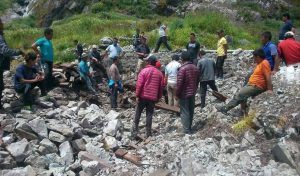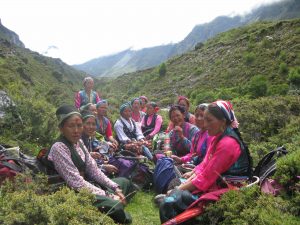A new collection archived with Paradisec (LAN1) provides documentation of the language of Langtang in Nepal. Langtang’s already small population was heavily affected when the earthquake in April 2015 triggered landslides in the Langtang valley; many of the voices in this collection are of those who died in the landslides. This project demonstrates that good documentation can be done by community members and non-linguists with the support of archivists and data managers.

While the Langtang region is well-known to as a trekking destination in Nepal, almost nothing is known about the people who live there, the language that they speak, and its relationship to other Tibeto-Burman languages. The ethnic Tibetan Langtangpa population have called the valley home for at least 4 centuries and speak a language that shares features with those of their Kyirong neighbours in the north, and Yolmo neighbours in the south.
On hearing that there has been no documentation made of the Langtang language, Radka Kvicalova and Becky Slade decided to start a project in the Basic Oral Language Documentation (BOLD) method. Neither are trained linguists, but learnt how to use audio recorders and build the metadata for their documentation project. Their aim was to build a project that could be a useful record of the Langtang language for both the community, and researchers interested in the language. They worked to ensure that all materials would be open access archived, with written or oral transcriptions and translations into either English or Nepali. When I heard about their work on a field trip to Nepal I helped them arrange an archiving plan with Paradisec. The collection is now available as Paradisec collection LAN1.
Becky and Radka began their documentation in Langtang in 2014. While the 2015 earthquakes in Nepal were devastating for many communities, the residents of Langtang were particularly hard hit. The earthquake on April 25, 2015 triggered a major avalanche that killed 187 of the 673 Langtangpa. Forty households disappeared, and many more were damaged. Almost the entire population were forced to relocate to Kathmandu to survive the winter. As a result of this tragedy and the ensuing displacement of the Lantangpa, the language, cultural heritage, and intergenerational knowledge of Langtang is increasingly at risk.
Their materials are now archived with Paradisec as collection LAN1. Included are a hundred recordings, making around five hours of primary data. These recordings include old folk stories about the Langtang area, personal stories and memories, descriptions about families, instructions on how to make a variety of local produce, songs, religious teachings and descriptions about the area and the type of livestock that is kept. Langtang people love to sing and have many songs in their language. Later recordings include people talking about the earthquakes and their aftermath.
One of the particular challenges in archiving these materials has been to ensure that the community feel comfortable with the open access condition on recordings of family members who passed away in the quakes. Almost half of the participants in the 2014 and 2015 recording sessions died in the earthquakes, meaning that in many ways this very contemporary work is already a legacy project. Although Becky and Radka gained consent to make the recordings, the formal oral consent recordings were not made for many of the speakers at the time of the initial recordings, as they wanted a chance to return and play materials back to people. Therefore, a small number of recordings in the collection are currently still closed access while these final permissions are negotiated.
These project materials have also become part of a larger Langtang Memory Project which aims to build a larger cultural and linguistic archive of historical and contemporary materials from the Langtang community. These recording form an important part of the pre-earthquake collection.

The LAN1 collection will continue to grow and develop as Becky and Radka complete their documentation project. Transcripts for some recordings, and the final SayMore project files will hopefully be included with the final project materials, as well as the final consent recordings from next-of-kin for those recordings of people speaking from before the earthquakes.
 Follow
Follow
Here at Endangered Languages and Cultures, we fully welcome your opinion, questions and comments on any post, and all posts will have an active comments form. However if you have never commented before, your comment may take some time before it is approved. Subsequent comments from you should appear immediately.
We will not edit any comments unless asked to, or unless there have been html coding errors, broken links, or formatting errors. We still reserve the right to censor any comment that the administrators deem to be unnecessarily derogatory or offensive, libellous or unhelpful, and we have an active spam filter that may reject your comment if it contains too many links or otherwise fits the description of spam. If this happens erroneously, email the author of the post and let them know. And note that given the huge amount of spam that all WordPress blogs receive on a daily basis (hundreds) it is not possible to sift through them all and find the ham.
In addition to the above, we ask that you please observe the Gricean maxims:*Be relevant: That is, stay reasonably on topic.
*Be truthful: This goes without saying; don’t give us any nonsense.
*Be concise: Say as much as you need to without being unnecessarily long-winded.
*Be perspicuous: This last one needs no explanation.
We permit comments and trackbacks on our articles. Anyone may comment. Comments are subject to moderation, filtering, spell checking, editing, and removal without cause or justification.
All comments are reviewed by comment spamming software and by the site administrators and may be removed without cause at any time. All information provided is volunteered by you. Any website address provided in the URL will be linked to from your name, if you wish to include such information. We do not collect and save information provided when commenting such as email address and will not use this information except where indicated. This site and its representatives will not be held responsible for errors in any comment submissions.
Again, we repeat: We reserve all rights of refusal and deletion of any and all comments and trackbacks.